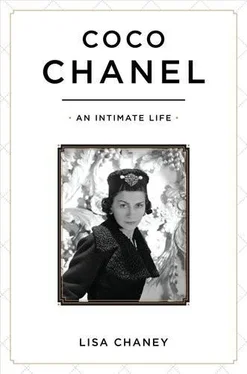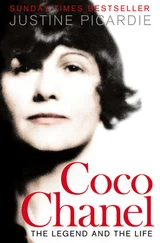Gabrielle’s personal involvement in the great cultural shifts taking place in these years made her a most interesting woman. As someone also involved in the forging of a new world, irrespective of whether he spoke about it or not, Stravinsky cannot have failed to recognize, and find stimulating, this difference in Gabrielle. In years to come, Gabrielle’s undignified inclination to represent Stravinsky as younger and less sophisticated than he was may have come about in reaction to her virtual omission from future discussion of this period in his life.
While snobbery was at the heart of the musical establishment’s motivation here, jealousy of Gabrielle may well have motivated the woman who would take charge of constructing Stravinsky’s legacy. This was Vera Sudei-kine, who began her own affair with him shortly after he was rejected by Gabrielle and who would eventually become Stravinsky’s second wife.
Meanwhile, fascinated as Misia was by Gabrielle and Stravinsky, she was also piqued at their affair, and when an opportunity arose, she strove to bring about its ruin. Gabrielle and Stravinsky’s mutual friends could see how deeply he was affected by her, while Stravinsky’s wife, Catherine, accepted his neglect with almost superhuman grace, concerned above all for his own and her children’s welfare.
Misia now put it about that she was horrified lest Stravinsky should divorce his poor wife so as to marry Gabrielle. Sert next took it upon himself to “talk” to Stravinsky, informing him that Capel had “entrusted [Gabrielle] to me; and a man like you… is known as a shit.” 15While Sert “cultivated the anguish” Stravinsky was suffering, Misia heightened the emotional atmosphere by telling Gabrielle that Stravinsky was distraught, and wanted to know if she would marry him. Having stirred up this drama, the Serts were then highly amused by Stravinsky’s distress and spread the story among their friends, including Picasso. At last, Gabrielle begged for the drama to stop and for Stravinsky to “come back.” He did, every day. If Gabrielle did not feel the depth of passion that her Russian lover felt for her, her mind, her emotions and her intelligence had nonetheless become engaged in a new way. Apart from anything else, the compliment of having an intelligent and highly creative man in love with her must have been restorative after her tormented months of mourning.
Stravinsky’s very Russian soul was, in itself, an escape for Gabrielle from herself into an exciting mental and emotional landscape. Indeed, she would say, “Russians fascinated me. Inside everyone from the Auvergne [the place she sometimes chose to claim as her own] there is an Oriental one doesn’t realize is there: the Russians revealed the Orient to me.” 16Gabrielle said that she found “all Slavs… naturally refined.” She must also, in Stravinsky, have identified with the deep seriousness central to the artist’s life. For a woman who said, “Nothing interested me any more… nothing at all, only esoteric things,” 17her love affair with Stravinsky had helped her, secretly still mourning, to feel herself more grounded and alive.
It had also brought a measure of humor, albeit a mad Russian version, back into her life. Someone who was not close enough to be sure about the affair would later write:
There were rumors of a great flirtation between her and Stravinsky; nobody knows how far it went. All I know is that once, after one of her large dinner parties in the garden of the Ritz, she asked for a glass of water and Stravinsky, in a playful mood, or maybe in a fit of jealousy, filled a large glass with vodka and brought it to her. Coco drank the strong alcohol practically in one gulp, stood up, and fell on the floor. She had to be carried to her bedroom. 18
Finally, when the Ballets Russes was leaving for a tour of Spain, Stravinsky asked Gabrielle to come with him. She said she would follow soon. Whether Gabrielle really intended going is uncertain because she allowed herself to be waylaid by circumstance, and Stravinsky was to wait for her in vain.
On February 9, 1921, not long after Stravinsky had left Paris with Diaghilev and the Ballets Russes, a young man recorded an evening with Gabrielle at the singer Marthe Davelli’s, with whom Gabrielle and Arthur had picnicked on the beach at Saint-Jean-de-Luz in 1915. Our diarist said of Gabrielle that he “hadn’t seen her for ten years.” Commenting that she “didn’t say a word about Boy Capel,” he said she was a most agreeable companion and was almost unchanged in looks. Gabrielle drove him home, “and we suddenly found ourselves on an amazingly friendly footing.” 1
The diarist was Grand Duke Dmitri Pavlovich, grandson of Tsar Alexander II and cousin of Tsar Nicholas II. No previous biographer of Gabrielle has had access to Dmitri Pavlovich’s diaries. But with them, we have been able not only to revise important aspects of their ensuing relationship but also to trace the course of a famed yet mysterious trip they made together not long after their meeting.
At thirty, Dmitri Pavlovich had already experienced a life of great upheaval. His mother had died at his birth and his father’s remarriage, eleven years later, had led to his banishment, so Dmitri and his sister, Marie, were placed with their aunt and uncle. Grand Duke Sergei loved his young charges, but the relationship became strained as they grew older. When this uncle was assassinated by an anarchist’s bomb in 1905, Dmitri was sent to a military academy; he was fourteen. The men he loved — his educational supervisor, his father and the tsar — through personality or circumstance, were all to thwart Dmitri’s need for a man he could unreservedly admire. As an intelligent young patriot, he combined traditionalism with what he saw as open-mindedness. Although wishing to serve his country in some significant way, Dmitri also felt inadequate to the task because of a lack of self-assurance.
In 1916, he was one of those involved in the conspiracy to murder the “holy man” Grigori Rasputin, whose hold over the tsarina had become deplorable. After hours of black farce, the assassins rolled Rasputin up in a curtain, tied it with rope and then dumped him in the river Neva through a hole in the ice. When discovered, Rasputin had survived poisoning and gunshot wounds, finally to die by drowning. Dmitri’s efforts at improving the situation in his country were largely frustrated. Camouflaging his shyness and any depth of character behind his good looks and the persona of a charming playboy, he always found it difficult to be taken seriously.
Rasputin’s murder led to Dmitri’s exile to an army unit on the Persian front. Thus, when most of the Russian royal family — including his father, brother and aunt — was murdered by the Bolsheviks in 1918, Dmitri was one of those few who escaped the slaughter. Throughout his life, great privilege had served him ill in his loss of every figure of significance, save his sister, Grand Duchess Marie. A life already filled with such loss may have inhibited Dmitri in the formation of close attachments aside from his sister.
Making his way to Britain from Tehran at the end of the war, Dmitri was permitted to take up residence. Here he studied in preparation for his possible future role as tsar. He also continued socializing, with a noted predilection for actresses and ballerinas. Dmitri’s sister described his life before the revolution:
He had had a large fortune with very few responsibilities… unusually good looks coupled with great charm, and he also had been the recognized favorite of the Tsar… there was no young prince in Europe more socially conspicuous than he was, both in his own country and abroad. He walked a golden path… His destiny was almost too dazzling. 2
Читать дальше












